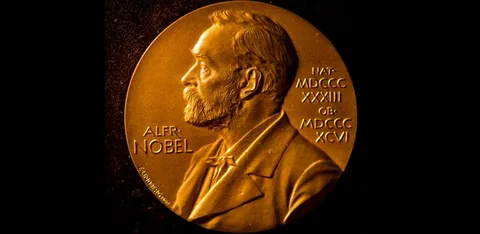The Nobel Prize is one of the most prestigious awards in the world, recognizing individuals and organizations that have made outstanding contributions to humanity. Every year, the Nobel Prize highlights achievements in science, literature, peace, and economics. It celebrates innovation, courage, and the power of knowledge to change the world.
The Origin of the Nobel Prize
The Nobel Prize was established by Alfred Nobel, a Swedish inventor, engineer, and industrialist. He was best known for inventing dynamite, but he wanted his legacy to focus on peace and progress. In his will, written in 1895, Alfred Nobel set aside most of his fortune to create a series of awards for those who bring the greatest benefit to mankind.
The first Nobel Prizes were awarded in 1901 in the fields of Physics, Chemistry, Medicine, Literature, and Peace. Later, in 1969, the Nobel Memorial Prize in Economic Sciences was added. The Nobel Foundation was created to manage the funds and ensure that Nobel’s vision continues each year.
The Selection Process
The selection process for the Nobel Prize is detailed and fair. Committees are formed in different institutions depending on the category. For example, the Royal Swedish Academy of Sciences awards the prizes in Physics, Chemistry, and Economics. The Karolinska Institute awards the prize in Medicine, while the Swedish Academy handles Literature. The Nobel Peace Prize is awarded by the Norwegian Nobel Committee.
Every year, experts, professors, and previous laureates are invited to submit nominations. The committees review each nominee’s work carefully before announcing the winners. The decisions are based on real impact, originality, and contribution to society.
Categories of the Nobel Prize
-
Nobel Prize in Physics – Given for groundbreaking discoveries in physical science that help humanity understand the universe.
-
Nobel Prize in Chemistry – Honors achievements in chemical research that contribute to scientific and industrial progress.
-
Nobel Prize in Physiology or Medicine – Recognizes advancements in medical science that improve human health and save lives.
-
Nobel Prize in Literature – Awarded to authors, poets, and writers whose work shows outstanding creativity and human insight.
-
Nobel Peace Prize – Celebrates those who have worked for peace, human rights, and the betterment of societies.
-
Nobel Prize in Economic Sciences – Acknowledges research and innovation that contribute to the understanding and improvement of economies.
Importance of the Nobel Prize
The Nobel Prize carries deep importance beyond recognition. It encourages people to push boundaries and dedicate their lives to positive change. For scientists, it is a mark of excellence that recognizes years of research and discovery. For writers and peace activists, it is proof that words and actions can shape the future of nations.
Winning a Nobel Prize often brings attention to important issues. For instance, when a peace activist or organization receives the Nobel Peace Prize, it highlights the importance of justice, equality, and dialogue in resolving conflicts. In literature, the award promotes languages, cultures, and stories that might otherwise remain unheard.
The Impact on Society
The Nobel Prize has inspired generations across the world. Many young students dream of becoming scientists, doctors, or writers after learning about Nobel laureates. It serves as a symbol of hope and possibility — proving that one person’s dedication can make a difference globally.
The award also brings together nations through shared values of peace, knowledge, and progress. Over the years, the Nobel Prize has helped raise awareness about issues like climate change, poverty, human rights, and health care. The influence of Nobel laureates extends far beyond their fields, inspiring governments and organizations to take positive action.
Famous Nobel Laureates
Throughout history, many Nobel laureates have become household names. Albert Einstein received the Nobel Prize in Physics in 1921 for his work on the photoelectric effect. Marie Curie remains one of the most inspiring figures as the first person to win two Nobel Prizes in different sciences. Martin Luther King Jr. received the Nobel Peace Prize in 1964 for his leadership in the American civil rights movement.
Writers like Rabindranath Tagore, Ernest Hemingway, and Gabriel García Márquez changed the literary world with their art and imagination. Each of these laureates showed that brilliance, courage, and compassion can create lasting change.
Criticism and Controversy
While the Nobel Prize is respected globally, it has faced criticism at times. Some argue that the selection process is not always fair or that deserving candidates are overlooked. There have also been debates about the Peace Prize being awarded for political reasons.
Despite these controversies, the Nobel Prize remains a powerful symbol of human achievement. It continues to promote dialogue and inspire excellence across fields.
Conclusion
The Nobel Prize stands as a tribute to human potential. From science and medicine to literature and peace, it honors those who dedicate their lives to bettering the world. More than just an award, it is a reminder that progress depends on ideas, integrity, and compassion.
Each Nobel laureate shows that no matter where a person comes from, their work can influence generations and make history. As long as there are thinkers, dreamers, and doers, the spirit of the Nobel Prize will continue to shine as a light of hope and inspiration.













Comments are closed